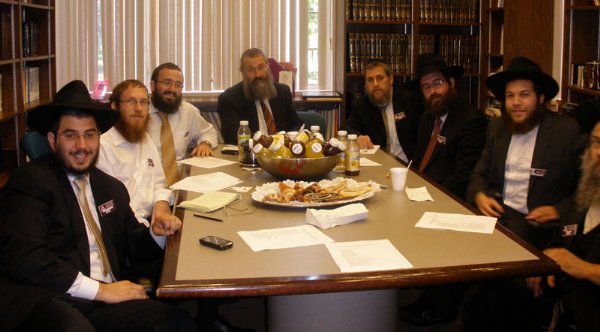
When Rabbi Yosef Carlebach’s phone rang at 5:30 a.m. several weeks ago, he was told there had been a collision involving a bus and another vehicle on Route 78 in Bedminster.
As a chaplain for the New Jersey State Police, he was rushed from his Monmouth County home to the scene with a police escort. He found a group of young boys and their fathers from a Pittsburgh yeshiva on their way to a Lag B’Omer parade in Brooklyn.
 |
|
Rabbis gather at Chabad House at Rutgers University in New Brunswick for the July 12 inaugural meeting of a statewide organization for Chabad chaplains. Photo by Debra Rubin |
“Thank God no one was seriously injured, but I was there counseling and retrieving tefillin,” said Carlebach, who has done chaplaincy work for 32 years and recently became one of three chaplains for New Jersey Transit police.
“The state police are now following the military model so every chaplain has to be prepared to administer to any faith,” said Carlebach. “Anytime there is a major incident, a chaplain is part of the first-response team.” In fact, he said, the role of chaplain has become an integral part of law enforcement.
In view of this growing presence of chaplains — in law enforcement and other establishments — Carlebach has launched an organization for Chabad chaplains serving 36 institutions from Morris County to Monmouth County, including hospitals, nursing homes, and prisons.
Thirteen rabbis attended its inaugural meeting July 12 at Chabad House at Rutgers University in New Brunswick, where he is executive director.
Carlebach said having Jewish chaplains work with law enforcement also benefits the Jewish community. Two winters ago, a power line fell across the Garden State Parkway near Lakewood on a Friday afternoon. Hundreds of observant Jews heading home for Shabbat were trapped in the resulting traffic jam.
Carlebach and other community leaders informed the State Police that some people would be abandoning their cars so as not to desecrate the Sabbath by driving after sundown. Arrangements were made to take them to Jewish homes in the area until the end of Shabbat.
“The story about how understanding the New Jersey State Police were even made the papers in Israel,” said Carlebach.
Rabbi Yehuda Spritzer of Chabad House of Monroe serves as chaplain at the New Jersey State Prison in Trenton. In addition to counseling and serving the religious needs of the few Jews there, the job entails many nuances. Recently a Jewish inmate died, and his family wanted nothing to do with him even in death. It was left to Spritzer to make sure he got a proper Jewish burial.
Although the work is often difficult, said Spritzer, the rewards can be many. “There is an 85 percent recidivism rate for prisoners, so if I can help even one person do something with his life that he shouldn’t come back to prison, that is a tremendous mitzva,” he said.
Rabbi Yaakov Zirkind of Congregation Ahavath Yisrael in Morristown serves as chaplain at the Morris County and Sussex County jails as well as at Edna Mahan Correctional Facility for Women in Clinton.
He recalled a young woman there who was not particularly religious but requested a rabbi after her arrest on drug charges.
“I’m sure she wasn’t expecting someone like me,” said the bearded and traditionally dressed Zirkind with a smile. Yet the two struck up a relationship that continues to this day, long after her release.
“I get a call from her once a month to let me know she’s okay,” he said.


6:39 PM in New Brunswick, NJ
Shabbat Ends 7:42 PM
Friday, 3 May 2024
Parashat